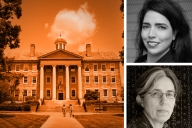You have /5 articles left.
Sign up for a free account or log in.
The University of South Florida announced on Wednesday that it would ease off on a one-year budget plan that some faculty members called “draconian,” but the change of heart comes only after a senior administrator resigned in protest.
Graham Tobin, USF vice provost for strategic and budget planning, resigned on July 30 after President Judy Genshaft announced an aggressive one-year plan to replenish the university’s cash reserves. The plan would tighten access to carry-forward cash and research funding, and institute a policy where the cost of any new hire had to be offset by savings or new revenues.
Genshaft expanded on the one-year plan on Wednesday in an open letter to the campus community. The administration now aims to rebuild the case reserves in three years, not one, and senior vice presidents will have more control over spending decisions involving their departments.
While budget cuts have become common in higher education, USF's cash reserves are an important factor in determining its bond rating. By continuing to exhaust its reserves, the universities could risk being downgraded. “These decisions are necessary today to protect our ability to invest in our new endeavors and our employees in the future,” Genshaft wrote. “Failure to act now will cost us more in the long run."
In his resignation letter, addressed to Provost Ralph Wilcox, Tobin said he found himself “in an untenable position, as I can no longer support the direction in which the university is apparently headed.” In particular, Tobin protested the attempt to “balance the budget in one year.” His resignation was first reported in the Tampa Bay Times on Wednesday. Inside Higher Ed obtained a copy of the letter through the USF office of university communications and marketing.
“It is my belief that, should these cuts be put into effect, the university's plans and metrics must be significantly amended ... to reflect USF’s new direction. I prefer not to be associated with this,” Tobin wrote.
Wilcox said Tobin was “essentially the lead architect” of USF’s strategic five-year plan, which he and a 39-member committee had worked on for the last year. The plan, approved by the USF Board of Trustees in June, would kick off this fall and guide the university through 2018.
“One of those assumptions Dr. Tobin and the task force for strategic planning made was that we were in good fiscal health,” Wilcox said. “When those assumptions changed, I think clearly Dr. Tobin interpreted such a shift as one that would threaten the strategic path of the institution.”
Tobin is traveling abroad and could not be reached for comment Thursday.
Wilcox acknowledged the university's dwindling cash reserves could become a problem unless the trend is reversed, but said USF's challenges were "no greater than that faced by other universities in the state of Florida."
Tobin argued Genshaft's one-year plan would have a "disproportionate impact on academic programs" that “hits at the heart of the mission of the university as laid out in the Strategic Plan,” effectively rendering it useless unless it factored in the cuts.
Genshaft said the move to protect USF's bond rating is necessary, but some faculty members said they felt the conversation about how to do so had not involved enough members of the USF community by the time the one-year plan was announced.
“The fact is the academic enterprise made clear to the president just how much devastation would be visited upon the institution if she continued with the one-year plan,” Faculty Senate President Gregory Teague said. “The process had not included sufficient dialogue with the affected parties. I think [Tobin] understood very clearly what the impact would be, but others in the senior administration were less informed about the nature of the beast.”
Tobin’s resignation is effective Aug. 30. Although he will return to USF in the fall of 2014 as a professor in the department of geography, environment and planning, Wilcox said he hoped Tobin would reconsider the decision to step down from his administrative position.
“He made a decision based on the knowledge he had at hand at the time,” Wilcox said. “If we were challenged to bring recurring expenditures in line with recurring revenues in one year, that would have brought questions of credibility to the strategic planning process that he very successfully led over the past year.... When he returns, I hope and expect that we will sit down and explore whether in fact these changing conditions are sufficient to convince him to return to his valued role.”
Since the budget plan now stretches across a three-year period, Wilcox said USF is “absolutely committed” to Tobin’s strategic plan.
“No consideration of veering on a different path at this point,” he said. "Our challenge will be aligning our institutional budget with the strategic plan while recognizing that we have a responsibility to strengthen the fiscal health of the institution."








